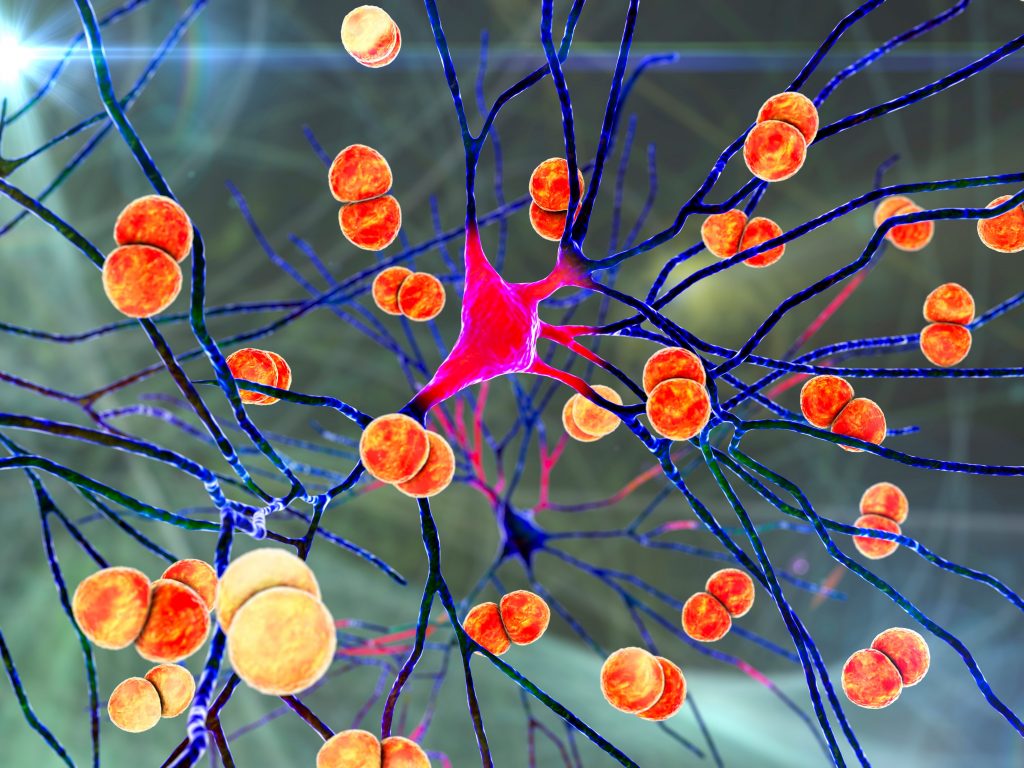- A meningococcal disease outbreak has killed at least seven people in Florida, and sickened 26.
- The bacteria that causes the illness infects the lining of the brain and spinal cord.
- It spreads by very close contact, like kissing. Fever, headache, and a stiff neck are the most common symptoms.
A meningococcal disease outbreak in Florida has killed at least seven people and sickened 26 more.
The CDC is calling this deadly spread "one of the worst outbreaks of meningococcal disease among gay and bisexual men in US history." Health officials are urging people in Florida who may be at risk to go get vaccinated as soon as possible.
Specifically, the Centers for Disease Control and Prevention is recommending meningococcal vaccination to men who have sex with men, and who live in or may be traveling to Florida.
Sam Crowe, an epidemiologist with the CDC who's been working the on outbreak said it's "frankly, pretty scary" and that "many of the cases are actually younger men" who "were healthy adults." Some had HIV, which is a known risk factor for meningococcal disease. "These people were hospitalized and underwent pretty intensive care," he said.
The agency is hoping to get the word out to all men who have sex with men in Florida to get vaccinated with the MenACWY vaccine as soon as they can.
"If you do not have insurance, a local health department should be able to provide your vaccination free of charge," the CDC says.
Meningococcal spreads through close contact, like kissing
According to the CDC, six of the deaths and 24 of the infections so far have been in gay and bisexual men who have sex with men.
Like monkeypox, meningococcal is not sexually transmitted, nor is it a gay disease. Rather, it is a bacteria — Neisseria meningitidis — that is present in about 1 in 10 people at any time. It can infect anyone who is in very close contact with an infected person.
"People do not catch the bacteria through casual contact, or by breathing air where someone with meningococcal disease has been," the Florida Department of Health said in April. "It requires close contact over a period of time, or direct contact such as kissing or sharing drinks."
This may be a big part of the reason why the illness has been disproportionately hitting certain demographic groups in Florida, but not others.
Crowe said that the two patients who've been identified in the outbreak who are not men who have sex with men actually "don't have direct links with any of the other cases," and that's not uncommon with this disease, as there can be multiple rounds of transmission without any detection.
Symptoms start vague, and worsen quickly
Meningococcal disease, while rare, can cause death in as little as 24 hours after symptoms begin.
"It's a terrible disease, so preventing it through vaccination is the best medical public health intervention," Crowe said.
Meningococcal can invade and infect the lining of the brain, spinal cord or blood stream, causing meningococcal disease.
The most common symptoms are high fever, headache, and a stiff neck.
"Symptoms can first appear as a flu-like illness, but typically worsen very quickly," the CDC said.
Other signs to watch out for include: nausea, vomiting, and a dark purple rash.
Vaccines and antibiotics are available, but you have to act fast
Meningococcal vaccines are already recommended for all teenagers in the US, but if it's been more than 5 years since your last shot, you may need a booster, so check with your healthcare provider.
Because the disease is caused by a bacteria (not a virus) doctors can prescribe antibiotics. But even with antibiotics, up to 15 in 100 people with meningococcal disease die, and to 1 in 5 survivors develop long-term disabilities, such as brain damage.
The CDC is working to identify people who've been exposed, and prescribe them antibiotics as a prophylaxis, which Crowe said is very effective at preventing disease. The agency is also doing some messaging in Spanish, as 14 of the 26 cases have been in Hispanic individuals.
"Because of the outbreak in Florida, and the number of Pride events being held across the state in coming weeks, it's important that gay and bisexual men who live in Florida get vaccinated, and those traveling to Florida talk to their healthcare provider about getting a MenACWY vaccine," Dr. José Romero, who directs the CDC's National Center for Immunization and Respiratory Diseases, said.
